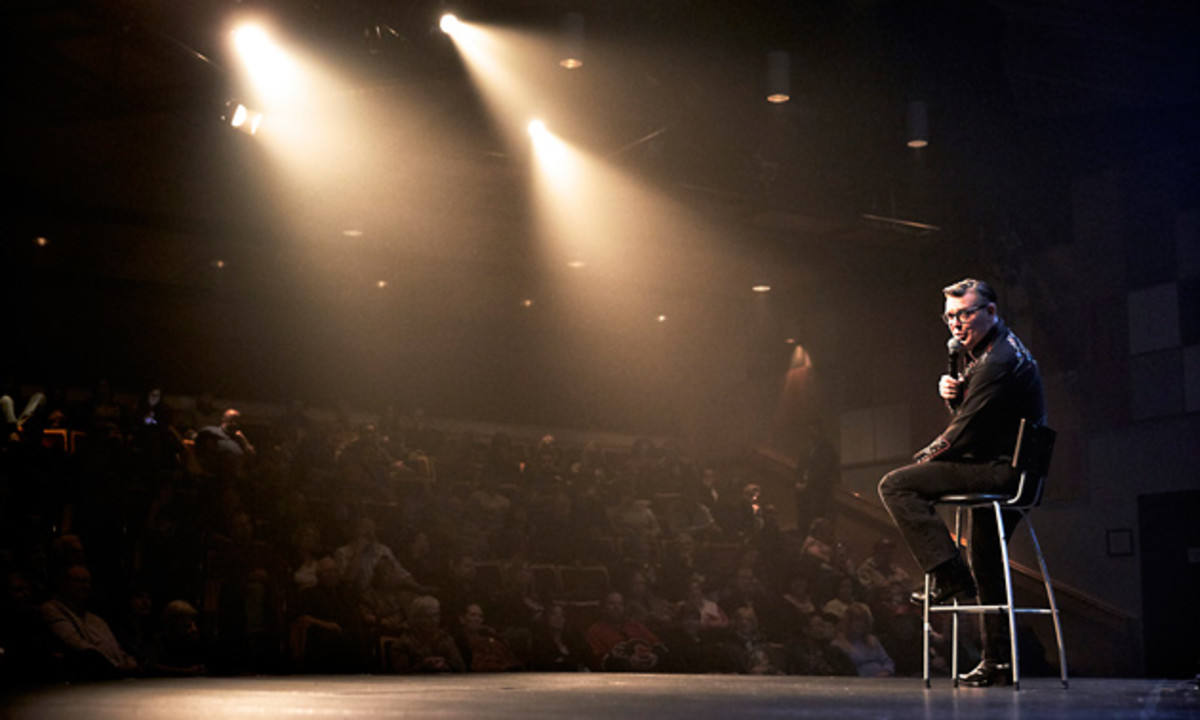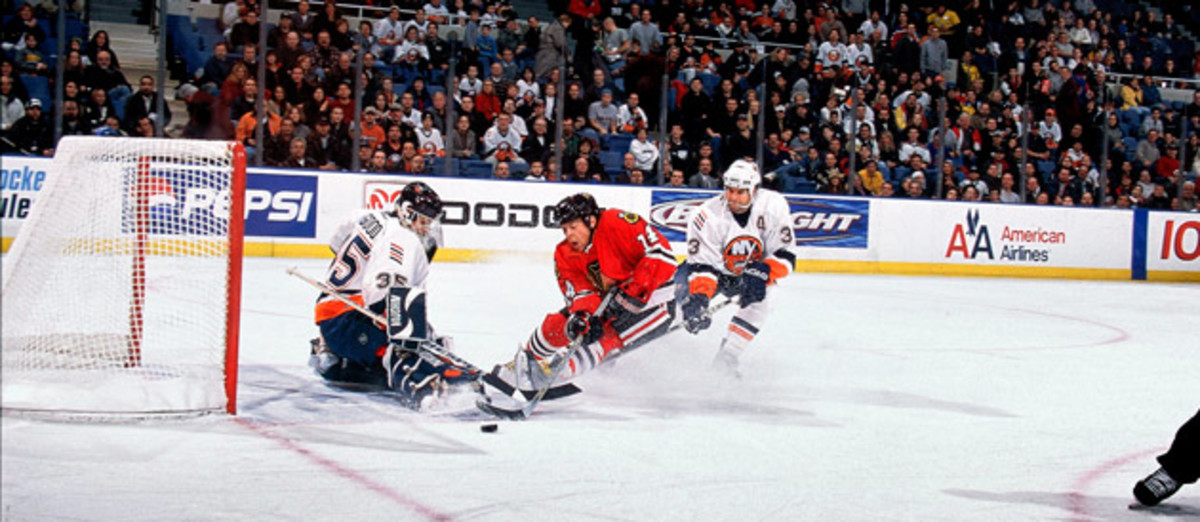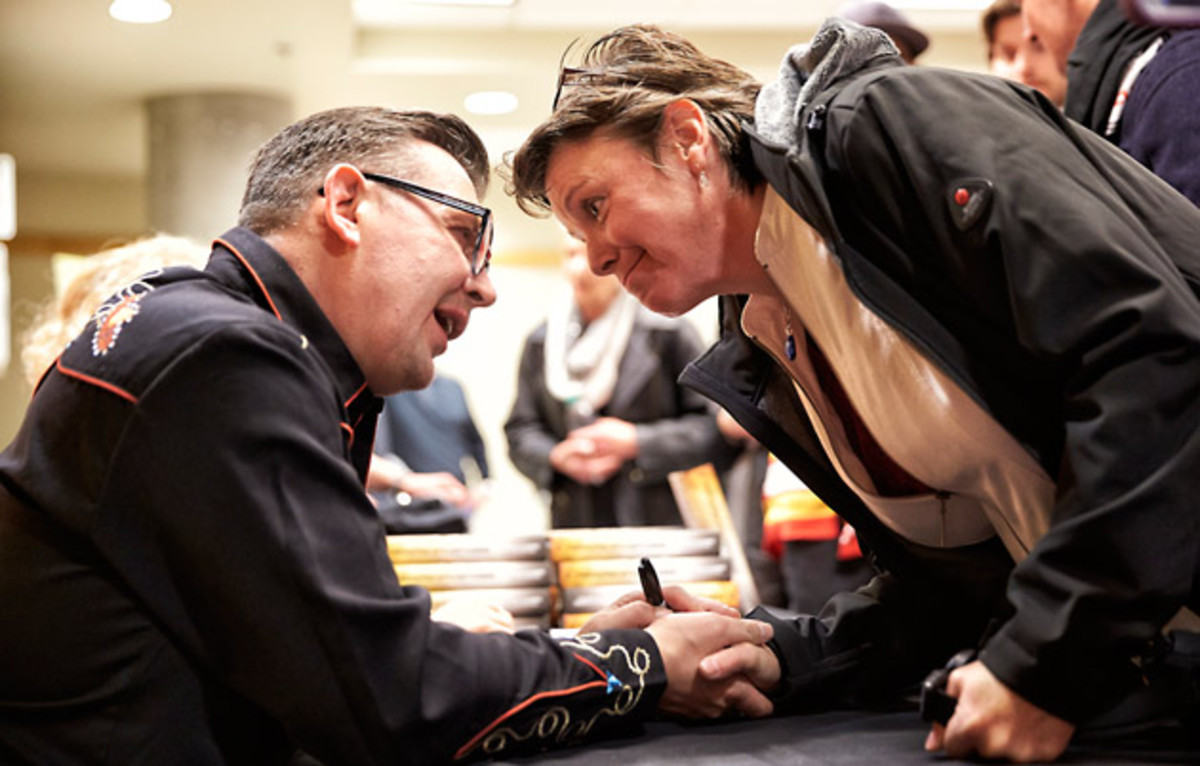Theo Fleury is giving voice to fellow survivors of abuse

This story appears in the July 4–11 edition of Sports Illustrated. Subscribe to the magazine here.
He hides in the shadows, stage left, and stares into the light past the curtains. He breathes in slow, and then out fast. The four other members of the band have taken their places. The crowd waits for him. “F‑‑‑‑‑‑ sold out,” he says. “Now I’m nervous.” This is unusual; he had always loved putting on shows. For 15 seasons he dazzled crowds at NHL rinks, a 5' 6", point-per-game pit bull. And now, on a rainy Saturday in March, Theo Fleury walks onstage in an auditorium near the Sidney, B.C., airport to entertain a packed house of 310.
Many bought tickets for the simple novelty of seeing their favorite player belt out country tunes. A local junior-B team, in the midst of its postseason, came seeking inspiration from a legendary right wing who won a Stanley Cup. Two fans splurged for the Silver Package, which cost $175 and included having their pictures taken in the dressing room with Fleury’s 2002 Olympic gold medal draped around their necks. Dozens of others brought their T‑shirts, hats and pucks, hoping to get them signed. For weeks southbound drivers on Highway 17 had glanced out of their windows and seen the cover of Fleury’s album splashed onto a billboard.
The lights fade. The sound of two guitars pick up. “Ladies and gentlemen,” the house manager says over the loudspeakers, “here’s proof that good things come in small packages.”
Fleury’s voice is deep and hardened, inspired by the artists his grandfather loved, like Johnny Cash. He believes his grandfather found peace in music, stroking the fiddle during family singalongs in rural Manitoba. Hockey once served a similar purpose for Fleury. “The one constant thing that made sense,” he says. But he does not skate much anymore, too competitive to play for fun, too out of shape to play competitively. None of his lyrics mention the sport—or the 455 goals, 633 assists and 1,840 penalty minutes—that made him famous, either. Instead, the 10-track album I Am Who I Am has cuts like “Sick As Your Secrets” and “Road To Misery.” They trace the long climb up from rock bottom.
"I was a lot more short, temper wise," Fleury says. "Anger for me was protection.STAY OUT OF THIS GUY'S WAY."
Much of the audience came for who Fleury is now, 48 years old and sober for the past 11, the superstar whose shame melted away like ice. They came to hear the voice that speaks for the estimated one in three Canadians who have been abused—physically, emotionally, verbally—as children; for the 95% of youth sexual assaults that go unreported in Canada, according to a 2013 study in Frontiers in Psychiatry; for the believed 70% of survivors who then seek drugs and alcohol to soothe their wounds.

They came to feel empowered by the man tapping his leather cowboy boots and raising his fist as he sings the chorus of the first song.
I am who I am
I stand for what I believe
To win from within
I am real/I am me/And I am free.
—“I Am Who I Am”
He walks through the lower bowl of Scotiabank Saddledome, the rink where he spent 11 straight years as a Flame, starting in 1988. Two days before the concert, Fleury has driven from his home outside of Calgary to watch the team’s morning skate. Here they remember him with joy. In the rafters hangs the banner honoring the Stanley Cup champions from 1989, when Fleury was a rookie. Downstairs, painted onto the wall outside the home dressing room, is the celebratory scene moments after Calgary clinched in Montreal. Fleury can be found in the front row, close to the grail. His whole body looks exhausted, except for one pointer finger extending in triumph.
Two decades later Fleury left Calgary with a similar image. Out of the league for six years while indefinitely suspended for violating the league’s substance-abuse policy, he attempted a comeback with the Flames before the 2009–10 season. He shed weight and returned to playing shape. He convinced commissioner Gary Bettman of his sobriety and had the suspension lifted. At an exhibition game against the Islanders, the home crowd chanted “Theo! Theo!” when he took the ice—and again when he deked and scored the eventual winner in a shootout. Eleven days later the preseason ended, and he retired. “When that went in the net,” he says, “I was good.”

While Fleury still wonders if his body could have even handled an 82-game schedule, he knows that returning for a 16th season would have challenged his mind even more. Two weeks after Calgary’s season opener, Fleury’s autobiography, Playing With Fire, was released. He conceived of the book as a way to showcase his on-ice legacy: seven All-Star Game appearances; the Olympic gold in Salt Lake City; the indelible image of him after scoring the OT winner against Edmonton during the ’91 playoffs, sliding on both knees and spinning like a top.

But the project took him into far darker territory. He detailed the booze and cocaine habits he developed as a teenager. The benders through strip clubs and casinos that lasted until dawn, at which point, he wrote, “I could pass out and not have to relive one moment of my miserable f------ existence.” The crystal meth overdose and his first divorce. The decision to leave Chicago in 2003, when another failed drug test left him with two options: receive treatment for at least two years or retire. “I didn’t want help,” he says. The memory of sitting on his couch in Santa Fe shortly thereafter, swigging vodka and holding a pistol. “How did it taste?” he wrote. “It tasted lonely. Cold, lonely and black.”
In the book Fleury publicly disclosed for the first time the sexual abuse he endured at the hands of his junior hockey coach Graham James. The assaults, Fleury wrote, began when he was 15 and occurred “once or twice a week for the next two years.” He felt imprisoned, terrified of revealing his secret and becoming “stigmatized forever as the kid who was molested by his coach. The Victim...
“I was tied up, maybe not with rope, but it was the same thing,” he wrote. “He was my coach. He was helping me. He knew so much about hockey. He controlled my f------ destiny.”
Fleury wondered how the world would react to Playing With Fire. Generally the public lauded his courage and respected his honesty. For hockey fans the revelations helped explain Fleury’s intense, often enraged style on the ice. But the real answer—and one he didn’t know he needed—came at his first book signing that October. He tells this story often. The audience in Sidney will hear it too. It goes like this:
Among a crowd of 400 at a Toronto bookstore Fleury spots a man clutching the book against his chest and looking at the floor. “He was in survival mode,” Fleury says. For the next hour and a half, Fleury tracks the man as he shuffles through the long line, closer and closer to the table where Fleury sits. Finally, when the man’s turn arrives, he leans close and whispers, “Me too.”
That is what is at the core of our healing: finding our purpose.
—Conversations With a Rattlesnake, 2014
He stands alone at the microphone. This happens at every gig for Theo Fleury and the Death Valley Rebels. The idea came from Paddy McCallion, the band’s manager and lead guitarist. Midway through the show, Fleury leaves so the Rebels can play a short set. And after, he returns to an empty stage to tell his story. “It’s not about being top of the charts,” says McCallion, who met Fleury during his one season with the Blackhawks. “It’s not about anything like that. It’s a whole different message we’re bringing to the table.”
Fleury’s path to recovery had only just begun with the man at the bookstore. During each signing and every interview for Playing With Fire, Fleury was retraumatized by reliving the details of the abuse. Without having the tools to handle the pain, he clung to hate—at the Canadian justice system, which had previously pardoned James for another sex crime after he had served 3-1⁄2 years in prison; at James, who ultimately pleaded guilty in December 2011 to abusing Fleury and another former player; at himself, for the shame he carried. “I was a lot more short, temper-wise,” he says. “Anger for me was protection. Stay out of this guy’s way.”
"When the guys in the band see [his connections with fans], they are like, I get it," bandmate McCallion says. "Now I KNOW WHY WE'RE DOING THIS."
Just as at the bookstore, though, one chance encounter moved Fleury forward. In May 2012, at a conference in Winnipeg, Fleury met an occupational therapist from Victoria, B.C., named Kim Barthel. A specialist in relational trauma, with field experience in Kosovo, Gaza and post-Katrina New Orleans, Barthel helped Fleury dig deeper than James’s abuse. She explained how Fleury’s chaotic childhood left him predisposed to addictive behavior; how James preyed on young Theo’s need for approval from an attachment figure. Says Barthel, “He’s come to that place of seeing how it was all that early-childhood stuff that made him sexually vulnerable to a predator.”
“That’s when I realized, there wasn’t anything I could’ve done differently,” Fleury says. “She talked about trauma like nobody I’d ever run into at any point. I thought it was my fault. All that guilt, all that anger was still pretty prevalent in my life until I met her.”
In 2014, Fleury and Barthel turned their talks into his second book, Conversations with a Rattlesnake. It is written as a dialogue between the two authors, about healing from trauma. Fleury likes the rattlesnake metaphor. “It’s not a predator,” he says. “It sheds its skin and reinvents itself.”
Pretty soon the pair was hitting the road together, hosting forums around Canada. Once, in Calgary, a 12-year-old described his abuse to a room of 250, mostly adults. Three years ago, in Nanaimo, B.C., a man revealed himself to a room full of survivors as both a victim and a violent offender. “And nobody was antagonistic,” Barthel says. “Everyone oriented in his direction [because he] identified with the whole cycle of trauma.”
This is what gives Fleury his rush today—not fifths or eight-balls or hat tricks but helping others, as he puts it, “sit with their s---.” As he tells the audience before the music begins again, “Something that we think is uncommon is actually the most common thing that happens in the world, and that’s trauma. And so it’s really been an absolutely incredible journey.”
Gettin’ rid of all our shame/Let’s lift our
heads and never bow them again/
Courage through and through.
—“Walk With Thousands”

He sits in the backseat, passenger’s side, riding to Barthel’s house. It was past midnight when Fleury finally left the theater, after speaking to the junior hockey players and showing them his gold medal. Before that he spent about an hour behind the merchandise table—signing jerseys, smiling for pictures and hearing the two-word whisper he always does.
“How many me too’s did you count?” Barthel asks Fleury in the car.
“Oh, at least 30,” he replies.
At first, music was a bucket-list venture, another way to reconnect with the spirituality of his indigenous Métis roots—the fiddles, the firesides, the singalongs. So he produced his first song with a friend in Winnipeg, then wrote more with McCallion, who then formed a backup band. “Death Valley Rebels,” Fleury says, “are those who refuse to die.” He took voice lessons, released the album last October and started touring in early March, hitting Calgary and Medicine Hat, Alberta, before Sidney. Quickly he found that performing on stage was no different from holding forums in bookstores or prisons or hotel conference rooms.
• SI VAULT: Sober Fleury returns to the ice in Belfast (12/12/05)
Tonight there was the elderly woman who told him, “Safe journey. Don’t give up. You’re a brave man. Prime minister one day.” The woman with a Flames puck: “Me too, a fellow hockey player.” The aspiring radio broadcaster in a Flames T-shirt whose family disowned him for reporting abuse. And a woman who approached Fleury during the show, passing him a folded piece of paper, onto which she had typed, i too am a survivor.
“When the guys in the band see it firsthand, they are like, S---, I get it,” McCallion says. “Now I know why we’re doing this.”
Manon Rheaume, NHL's first female goalie, continues to inspire
Fleury feels the voices increasing in volume, advancing the conversation. Look at the other athletes who have revealed their own traumas, he says: boxer Sugar Ray Leonard, pitcher R.A. Dickey, judoka Kayla Harrison and most recently former NHL center Patrick O’Sullivan. The week before the concert in Sidney, Lady Gaga had performed at the Oscars, flanked by sexual-assault survivors as she sang “Til It Happens To You,” from The Hunting Ground, a documentary about campus rape. Fleury watched with his fiancée, Elle Presley, a fellow survivor of childhood abuse. Together they wept.
“People are becoming more comfortable,” he says. But the work never stops. The next week he and Barthel will hold their 33rd Conversations forum in an aboriginal section of Ontario. In late April he will spend five days giving 12 speeches across the Northern Territories; in one community Fleury will hear allegations of an active sexual assaulter living there but will find no one willing to file a report. “That’s the power of abuse, right there,” he says. “What we’re trying to do is take the shame out of it and speak about it openly.”
This month Fleury will conduct the third Victor Walk, an event he created to raise awareness for childhood trauma. It goes from his Manitoba hometown of Russell, to Winnipeg, a journey of 279 miles. On the fifth and final day 11 other walks—from Halifax to Calgary to New York City—will simultaneously start across North America.
• SI’s Where Are They Now issue: This year’s stories, all in one place
The first Victor Walk happened in 2013, starting at a child abuse monument in Toronto and ending on Parliament Hill in Ottawa. Beforehand Fleury and a friend wrote “Walk With Thousands” as an anthem. The lyrics are uplifting, projecting an image of a powerful force moving forward together: We are no longer just a face in the crowd/We found our voice and now we’ll sing it loud.
As 1 a.m. nears, the song is playing on the car stereo. Fleury rests his hand on his fiancée’s shoulder and looks out the window. The billboard fades in the rearview mirror, Theo Fleury watching over the road.
